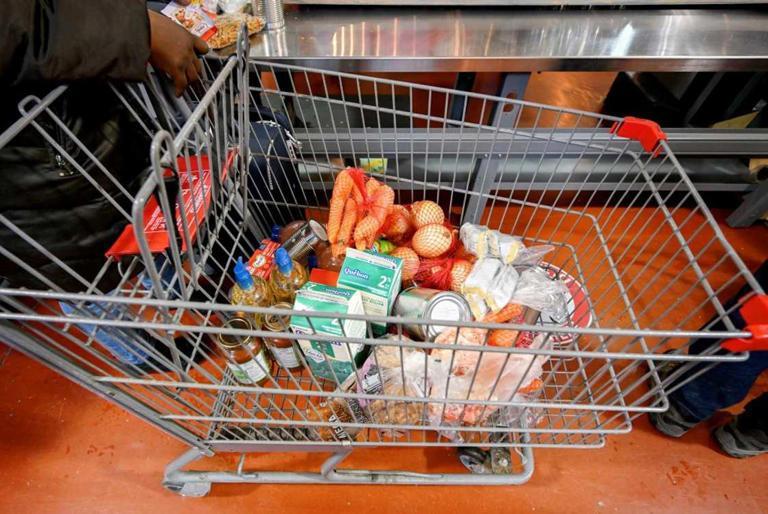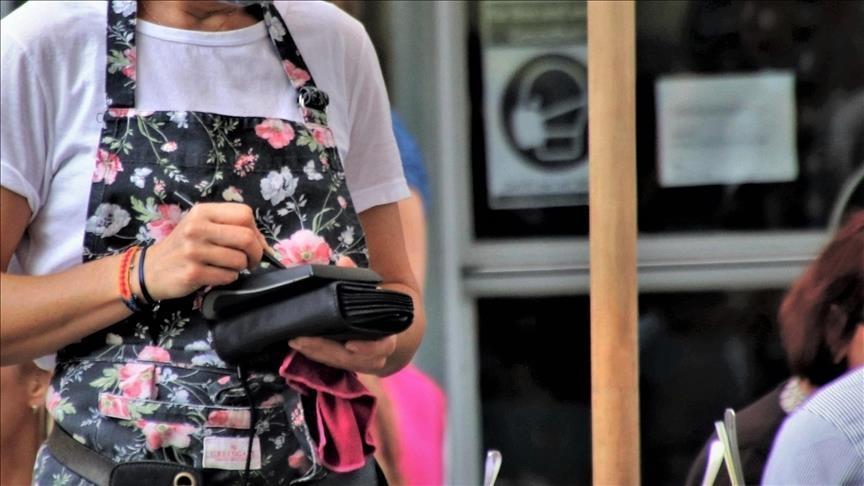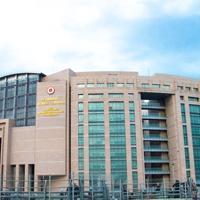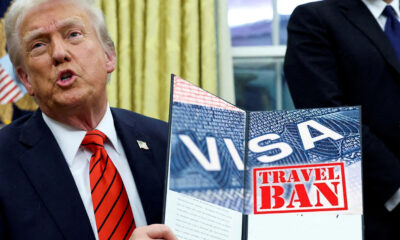Economy
Trump threatens huge tariffs on European wine, spirits
WASHINGTON

DECANTsf Bottle Shop and Bar co-founder Simi Grewal, left, puts a bottle of Château du Cauze, Saint-Emilion Grand Cru, a French Bordeaux wine, into bag after being purchased by Carlos Olivares, middle, and Morgan Berry at Grewal’s store in San Francisco, Thursday, March 13, 2025. (AP Photo/Jeff Chiu)
U.S. President Donald Trump on Thursday threatened to impose 200 percent tariffs on wine, champagne and other alcoholic beverages from European Union countries, in retaliation against the bloc’s planned levies on American-made whiskey.
class=”cf”>
Trump has launched trade wars against competitors and partners alike since taking office, wielding tariffs as a tool to pressure countries on commerce and other policy issues.
His latest salvo was a response to the European Union’s unveiling of tariffs on $28 billion in U.S. goods, to be imposed in stages starting in April.
The EU measures — including a 50 percent tariff on American whiskey — were a tit-for-tat measure against Trump’s levies on steel and aluminum imports that took effect Wednesday.
“If this Tariff is not removed immediately, the U.S. will shortly place a 200% Tariff on all WINES, CHAMPAGNES, & ALCOHOLIC PRODUCTS COMING OUT OF FRANCE AND OTHER E.U. REPRESENTED COUNTRIES,” Trump posted on his Truth Social platform.
Global markets tumbled on the news, with Wall Street down sharply, and criticism of the move was swift from European spirit makers.
French wine and champagne company Taittinger said a 200 percent tariff could bring the cost of some bottles from about $60 to more than $180.
class=”cf”>
France’s federation of wine and spirit exporters, known by the acronym FEVS, put the blame on the European Commission for placing its members “directly into the crosshairs of the U.S. president.”
“We are fed up with being systematically sacrificed for issues unrelated to our own,” said the group’s director general Nicolas Ozanam.
‘Hostile and abusive’
Trump called the EU’s planned levy on U.S. whiskey “nasty” and dubbed the bloc “one of the most hostile and abusive taxing and tariffing authorities in the World.”
The Republican billionaire president has also said the European Union — which for decades has been at the heart of a U.S.-led Western alliance — was formed to take advantage of the United States.
He told reporters he would not bend on his aggressive tariffs policy, while European Commission head Ursula von der Leyen said the bloc is ready to negotiate over escalating duties, though she insisted that tariffs are “bad for business.”
French Foreign Trade Minister Laurent Saint-Martin said his country would “not give in to threats” and was “determined to retaliate,’ while Spain’s agriculture minister said he hopes to negotiate.
U.S. Commerce Secretary Howard Lutnick told Bloomberg Television he had plans to speak with his European counterparts, while an EU spokesperson said its trade chief has reached out to Washington.
class=”cf”>
EU economy chief Valdis Dombrovskis meanwhile held an introductory call with U.S. Treasury Secretary Scott Bessent, in which he expressed concern over U.S. tariffs and their negative economic impact on both sides.
‘Devastating’
The European spirits trade group, Spirits Europe, called on both sides to stop using the sector as a “bargaining chip” in their tariffs fight.
U.S. wine merchants and restaurant owners also eyed Trump’s threats with trepidation.
class=”cf”>
A 200 percent tariff would send business costs “through the roof,” said Francis Schott, a restaurant owner based in New Jersey who serves European and American wines.
“It’s just business that will go away. It’s devastating,” he told AFP. “If I lose half of the profit I make on alcoholic beverages, my business is no longer viable.”
Europe exported nearly $5.2 billion worth of wine and champagne to the United States in 2023, according to the World Trade Organization.
EU levy ‘disappointing’
U.S. distillers have called the EU’s levy on American whiskey “deeply disappointing.”
A 2018 imposition of similar tariffs led to a 20 percent drop in American whiskey exports to the European Union.
Trump’s tariff wars have taken aim at Canada, Mexico and China over allegations they are not doing enough to curtail fentanyl smuggling or illegal immigration into the United States —- even if in the case of Canada, the border sees negligible smuggling.
He has also taken aim at commodities including steel, aluminum and copper.
Some countries like China and Canada have already imposed retaliatory tariffs, while uncertainty over Trump’s trade plans and worries that they could trigger a recession have roiled financial markets.
After talks in Washington on Thursday with Lutnick, Canadian science and industry minister Francois-Philippe Champagne said he saw “potential for a reset” in cross-border relations when new prime minister Mark Carney takes office Friday.
Economy
Sweden to hold talks on countering soaring food costs
STOCKHOLM

Sweden’s government said it will hold talks with food producers and distributers as a consumer movement over soaring costs in the Nordic country gains traction.
class=”cf”>
Annual food price inflation in Sweden hit its highest rate in two years in February at 3.9 percent.
Meanwhile, the independent watchdog site Matpriskollen (The Food Price Checker) found in January that prices in Swedish grocery stores had risen by 19.1 percent over two years.
“In view of the rapid price developments in the first months of the year and the rising prices in recent years, the Minister of Finance and Rural Affairs Minister will invite selected actors from the food supply chain for talks,” the government said in a statement.
The aim of the talks is to “listen to the industry’s assessment of the situation and work together to lower prices for customers,” it added.
The move comes as a viral online campaign calling for a boycott of major grocery stores next week has picked up speed.
One of the campaigners, Annika Morina, told newspaper Aftonbladet that she reached her breaking point buying tomato puree on Valentine’s Day.
class=”cf”>
“It had gone up 50 percent. I’ve seen these kinds of boycotts in countries in the Balkans and felt: ‘Why don’t things like that happen in Sweden?’,” she said.
She posted a video to TikTok calling for the boycott which has received tens of thousands of views and according to Aftonbladet thousands are expected to join the boycott.
Consumers in Croatia frustrated by soaring prices massively joined two boycott calls in January, sending daily sales down by over 40 percent.
Economy
UK boosts export financing for defense firms by $2.6 billion
LONDON

Britain’s Chancellor of the Exchequer Rachel Reeves (C) meets with defence suppliers at RAF Northolt on March 6, 2025 in Ruislip, west of London. Reeves met with UK defence suppliers to Ukraine.
The British government said on March 14 that it would increase its export credit facilities for weapons manufacturers by two billion pounds ($2.6 billion) to boost overseas sales.
class=”cf”>
The new funds “will see billions of pounds unlocked for U.K. defence companies that export overseas, driving economic growth and creating jobs across the U.K.,” it said in a statement.
Already the U.K. Export Finance agency has a lending capacity of eight billion pounds specifically for government clients of defence contractors, bringing the new total to 10 billion pounds.
Like other countries across Europe, Britain is racing to beef up its military production capabilities in the face of an expansionist Russia, pressure on European members of NATO to spend more on defence, and questions over President Donald Trump’s commitment to U.S. protection of Europe.
British Prime Minister Keir Starmer pledged ahead of a White House visit in February to boost defence spending to 2.5 percent of the economy by 2027, with the aim of hiking it to 3.0 percent in the next parliament.
“The world is changing, and we must bring about a new era of security and renewal that protects working people and keeps our country safe,” Chancellor of the Exchequer Rachel Reeves said in the statement.
Economy
Growth in services production index accelerated in January
ANKARA

The services production index increased by 6 percent on an annual basis in January, gathering pace from the previous month’s 2.6 percent rise, data from the Turkish Statistical Institute (TÜİK) showed on March 14.
class=”cf”>
The monthly increase in the index also quickened from 1.3 percent in December to 2.5 percent in January.
The index for transportation and storage services increased by 3.2 percent year-on-year but declined by 0.5 percent month-on-month.
Accommodation and food services rose 9.6 percent from a year ago and 0.5 percent compared to the previous month, the statistics authority said.
The annual and monthly increases in the index for information and communication services were 9.9 percent and 6.4 percent, respectively.
Real estate services rose 8.9 percent year-on-year, according to TÜİK data.
The prevalent price-setting behavior in the services sector leads to significant inertia and causes the impact of shocks on inflation to extend over a long time period, the Central Bank said in the summary of the March 6 Monetary Policy Committee meeting released on March 13.
Services inflation remains higher than goods inflation, it said, adding that having slowed down in the final quarter of 2024, services inflation increased in January due to the effects of items with time-dependent pricing.
-

 Daily Agenda2 months ago
Daily Agenda2 months ago5 suspects nabbed for sharing information with Iranian intel
-

 Politics1 month ago
Politics1 month agoSoutheastern city enforces fines to tackle student absenteeism
-

 Lifestyle2 months ago
Lifestyle2 months agoTürkiye’s Embassy in Doha hosts iftar for alumni to foster connections
-

 Refugees2 months ago
Refugees2 months agoInternational Women’s Day: global protests demand equal rights
-

 Sports2 months ago
Sports2 months agoPaulista 19 maç sonra geri döndü, maç sonrası isyan etti
-

 Daily Agenda2 months ago
Daily Agenda2 months agoTrump hangi ülkelere yasak getirdi.
-

 Politics2 months ago
Politics2 months agoIstanbul ‘may break 110-year temperature record for March’
-

 Daily Agenda2 months ago
Daily Agenda2 months agoMinister Uraloğlu Announced: Halkalı-Gayrettepe Will Fall to 57 Minutes

